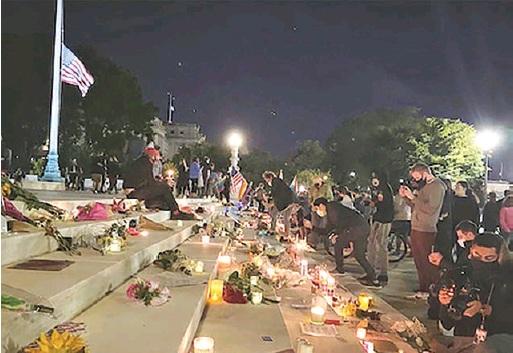September 23, 2020-- Ruth Bader Ginsburg — affectionately known as the Notorious R.B.G., a moniker that’s a take-off from the late hip-hop star The Notorious B.I.G. — died Friday, Sept. 18, following a lengthy battle with metastatic pancreatic cancer. At 87, the popular Supreme
Court Justice had fought with cancer and other illnesses for quite some time, determined to outlast the current administration as to ensure that Donald Trump would not be given the opportunity to appoint her successor.
“I was praying she could hold on,” stated acclaimed novelist Terry McMillan, echoing the words of many Americans both within and outside of the political spectrum.
Consensus among most U.S. citizens, considering the power wielded by President Trump and Senate Majority Leader Mitch McConnell (RKy.), points to the probability that Republicans will easily tally enough votes to replace Ginsburg quickly with a conservative- minded Supreme Court justice. toward lameduck status.
Still, Ginsburg’s loss remains palpable for millions of Americans.
“We have lost a champion of justice, an icon and patriot — a woman who lived the concept of building a more perfect union,” D.C. Mayor Muriel Bowser affirmed. “Justice Ruth Bader Ginsburg fought for us until the very end, and it is that fighting spirit — that we were fortunate as a nation to benefit from time and time again — that made us love, respect and admire her.
We are heartbroken.” Hillary Shelton, chief lobbyist of the NAACP, described Ginsburg’s death a sad day for America. “We are losing a real champion for civil rights, voting rights, women’s rights and human rights on our Supreme Court,” Shelton posited.
Shelton honored Ginsburg for breaking through many barriers for all Americans’ full participation and demanded Republicans wait until after the election to confirm a successor.
“It is our hope that whoever fills her position would have her same values. We also urge that the president withhold the nomination to fill that position until after the election,” Shelton said.
“It was Mitch McConnell who insisted not to allow President Obama to fill a position in his last year in office. We urge
that there not be a nomination or consideration by the U.S. Senate until after the November election,” Shelton said.
Through her cancer, Ruth Bader Ginsburg fought to the end with unwavering faith in our democracy and its idealsand that’s how she’ll be remembered, Obama expressed in a written statement. “But she also left instructions for how she wanted her legacy to be honored,” the popular former president observed.
Obama recalled when Republicans refused to hold a hearing or an up-or-down vote on his Supreme Court nominee,
Merrick Garland, and concocted the principle that the Senate shouldn’t fill an open seat on the Supreme Court before the swearing-in of a new president.
“A basic principle of the law — and of everyday fairness — is that we apply rules with consistency, and not based on what’s convenient or advantageous in the moment,” Obama demanded.
“The rule of law, the legitimacy of our courts and the fundamental workings of our democracy all depend on that basic principle. As votes are already being cast in this election, Republican Senators are now called to apply that standard.
“The questions before the Court now and in the coming years — with decisions that will determine whether our economy is fair, our society is just, women are treated equally, our planet survives and our democracy endures — are too consequential to future generations for courts to be filled through anything less than an unimpeachable process,” Obama concluded.
Sixty years ago, the Brooklyn-born Ginsburg applied to be a Supreme Court clerk. She’d studied at two of the country’s finest law schools and had ringing recommendations. But because she was a woman, she was rejected, Obama recalled.
Ten years later, she sent her first brief to the Supreme Court — which led it to strike down a state law based on gender discrimination for the first time. And then, for nearly three decades, as the second woman ever to sit on the highest court in the land, she proved a warrior for gender equality — someone who believed that equal justice under the law only had meaning if it applied to every single American.
“Over a long career on both sides of the bench — as a relentless litigator and an incisive jurist — Justice Ginsburg helped us see that discrimination on the basis of sex isn’t
about an abstract ideal of equality; that it doesn’t only harm women; that it has real consequences for all of us. It’s about who we are — and who we can be,” Obama remarked, noting that Ginsburg inspired the generations who followed her.
John Burns, a District lawyer and graduate from the Georgetown University School of Law, said he will never forget being in law school and having a front-row seat to the love affair that Ginsburg had with her husband, Martin D. Ginsburg, a former law professor at Georgetown.
“I was in law school from 2004 to 2007 and I spent time with her in 2006 because her husband Marty was my tax law rofessor at Georgetown,” Burns said. “I first met her when she came to meet her husband after class. It was magical to see a couple that had been married for so long share that bond. He was such an avid believer in her. ”
Burns, 38, reflected on the time he spent with Bader and the late Congressman John Lewis. He said the two shared a similar spirit.
“The level of difference both showed in ordinary people — the level of humility, the level of respect they give to everyone — I carry that to this day,” he said.
Justice Ginsberg always voiced strong and principled demands for justice and equality for all, and she was a lifelong champion of women’s and civil rights declared Marcela Howell, the founder and president of “In Our Own Voice: National Black Women’s Reproductive Justice Agenda.”
“We are putting the U.S. Senate on notice; we demand that no nominee be voted on until a new president is elected.
We will take to the streets in protest if McConnell and his cohorts do not abide by their own precedent,” Howell avowed.
“We promise to continue Ruth Bader Ginsburg’s fight for freedom. As we mourn, we will honor her life and legacy by fighting hard to demand a worthy successor. And we will fight even harder to ensure that all votes are counted on Election Day,” she said.


